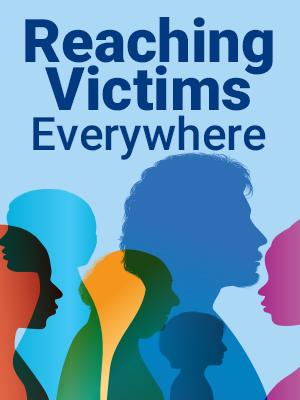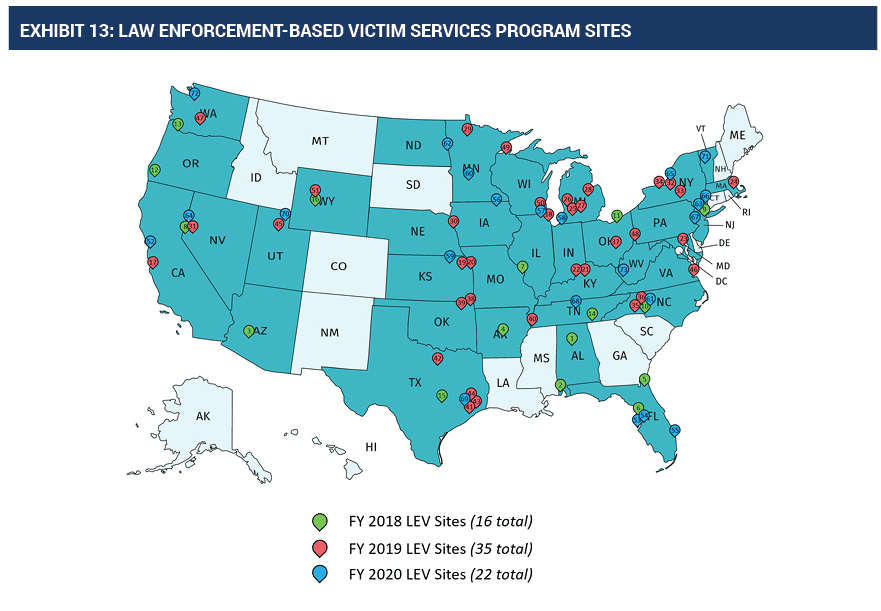Archival Notice
This is an archive page that is no longer being updated. It may contain outdated information and links may no longer function as originally intended.
Support for Law Enforcement
OVC supports partnerships with law enforcement agencies at the state, tribal, and local levels to combat crime, promote safer neighborhoods, and establish collaborations between police and the communities they protect. Through discretionary grant programs, OVC grantees help agencies provide effective, trauma-informed law enforcement practices to better serve all victims. OVC also funds national-scope discretionary programs to provide comprehensive services to victims and family members in the aftermath of crime. These national-scope initiatives help demonstrate the benefits of law enforcement efforts in addressing the needs and rights of victims of crime.
Since FY 2018, OVC has awarded over $30 million to more than 70 project sites—including more than 20 awards in FY 2020—to develop or enhance victim assistance service programs within law enforcement-based systems through the Law Enforcement-Based Victim Services Program (LEV) (see exhibit 13). This program intends to better coordinate partnerships with community-based programs to serve the broader needs and rights of all crime victims with the goal of increasing the number of victim services programs in state, local, and tribal law enforcement agencies. Since FY 2019, the International Association of Chiefs of Police (IACP) has been awarded nearly $5 million to serve as the training and technical assistance (TTA) provider for the sites funded under this program.
There were 53 active LEV grantees during FYs 2019 and 2020. These grantees served 14,012 victims of crime, with domestic and/or family violence (36 percent) and adult physical assault (23 percent) identified as the most prominent victimization types. Law enforcement grantees provided services across all categories, with the most commonly requested services including information about the criminal justice process (14,147 occurrences); information about victim rights (10,909 occurrences); referrals to other services, supports, and resources (8,563 occurrences); referrals to victim service programs (7,828 occurrences); and crisis intervention (7,047 occurrences). Over the 2 years, there were 95 partners on average involved in these programs per quarter.
In addition to victim services, TTA was provided. There were 55 trainings completed with 1,054 participants, including victim service providers, law enforcement, victim advocates, and community-based organizations. Of the trainings completed, 372 feedback surveys reported 98 percent overall satisfaction and a 95 percent increase in knowledge. There were also 300 technical assistance requests completed with 708 recipients.
In 2003, OVC partnered with IACP to create a demonstration initiative to implement and evaluate a strategy for improving law enforcement agencies’ responses to victims of crime. The resulting Enhancing Law Enforcement Response to Victims: A 21st Century Strategy (ELERV) was published in 2009. ELERV included a set of resources with support from agencies around the country that assisted in developing, pilot testing, and validating the strategy. In FY 2018, OVC awarded $1.5 million to IACP to continue providing subject matter expertise to demonstration sites and conduct an evaluation of ELERV by local research partners. In FY 2020, IACP released the second edition of ELERV, which incorporates lessons learned from the three agencies—located in Chattanooga, Tennessee; Saginaw, Michigan; and Casper, Wyoming—that implemented ELERV in 2014–2019. ELERV introduces law enforcement leaders to the benefits and methods for adopting victim-centered, trauma-informed philosophies to improve the response to crime victims. ELERV includes—
- videos that introduce the strategy and the four core principles,
- customizable templates that can be used to enhance communication with victims,
- tools that can aid in victim response efforts, and
- resources developed by organizations that support law enforcement’s role in serving victims.
In FY 2019, OVC awarded more than $600,000 to IACP to provide support, guidance, and technical assistance to six law enforcement agencies as part of the Integrity, Action, and Justice: Strengthening Law Enforcement Response to Domestic and Sexual Violence Demonstration Initiative. This initiative seeks to build law enforcement's capacity to raise awareness about the existence and impact of gender bias to enhance services to sexual assault and domestic violence victims.
Law Enforcement and the Communities They Serve: Supporting Collective Healing in the Wake of Harm was a demonstration project that addresses the needs of those directly affected by community-police tensions or harm. This project sought to—
- help communities develop both a preventative and reparative focus to reduce tensions,
- maximize communication,
- ensure that victims receive a just and meaningful victim-centered response,
- address officer health and well-being, and
- promote problem solving between law enforcement and the communities they serve.
Under this project, five law enforcement agency-led demonstrations sites were selected in January 2018 to partner with local community-based organizations. The sites were—
- the Baton Rouge Police Department,
- the Houston Police Department,
- the Minneapolis Police Department,
- the Oakland Police Department, and
- the Rapid City Police Department.
Over the course of this 4-year project—which included FYs 2019 and 2020—IACP, together with five police departments, community partners, and a cadre of national subject matter experts set out to promote collective healing in the wake of harm, acknowledging the need and desire of police and communities to come together to address the impact of trauma on those served and the workforce providing services. Each site assessed the strengths and challenges facing their community and their police department, and the relationship between the two; and explored the connection between historical trauma and present-day experiences and the lasting effect of these tensions and trauma on both law enforcement and the communities they serve. Read the findings of the project here.
With support from OVC, the FBI launched ELEVATE (Excellence in Law Enforcement-based Victim Assistance Training and Enrichment) and hosted the first trainings in FY 2019. ELEVATE aims to pinpoint effective practices for police-based victim services programs and to create national standards to guide their delivery. This forward-looking initiative devotes full-time attention and resources to identifying and understanding the methods and scope of current victim services programs in the United States; and supporting and promoting new and innovative law enforcement efforts.
For additional information, visit OVC’s website.





